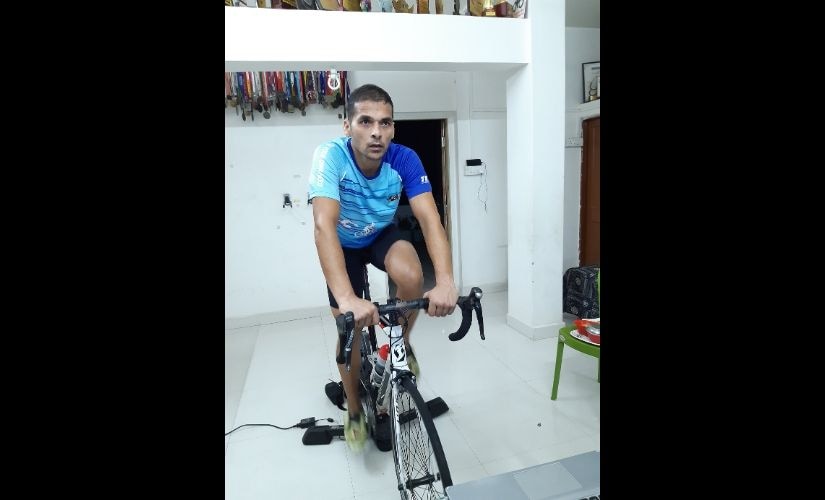Over the last few weeks, the COVID-19 pandemic has put a dampener on most celebrations around the world. But despite all the restrictions, Amit Samarth wanted to make his 40th birthday on 5 May a memorable one. A few weeks before his birthday, Samarth arrived at a fitting celebration to mark his special day. While the endurance cyclist based out of Nagpur has been part of a number of long-distance races in the past, such as the Race Across America (4,940 kilometres) and the Trans-Siberian Extreme (9,100 kilometres), this challenge was to be of a different kind. He decided to take on the onerous task of riding a stationary bicycle at a stretch for 48 hours on an indoor trainer, and along the way, raise funds for the Maharashtra Police forces who have been at the forefront of the prevailing lockdown. By the end of the effort, Samarth had not only pulled off a mammoth ride of 1,301 kilometres, — to put it in perspective, this is the distance covered when travelling from Mumbai to Lucknow on the fastest route, according to online maps — but had also managed to raise over Rs 2 lakhs for the cause. [caption id=“attachment_8376831” align=“alignnone” width=“825”]
 Endurance cyclist Amit Samarth celebrated his birthday this year by cycling indoors for a stretch of 48 hours to raise funds for the Maharashtra Police forces who are leading the way during the lockdown.[/caption] “I had never been part of a fundraiser of this nature before. It was an idea forced by the lockdown, since I couldn’t step out to cycle as part of my training,” Samarth says. “Then again, I had no intention of chasing big numbers. I just wanted to let people know what was possible despite the lockdown, and highlight the importance of staying fit during this time. And of course, raise funds for the most underrated warriors of this pandemic,” he adds. Samarth’s training routine took a beating ever since the lockdown was imposed, as did his daily schedule as a full-time endurance coach. It took him a while to get comfortable with new norms, such as conducting online sessions for his students, and spending hours on an indoor trainer in the confines of a room. However, the weather made things all the more challenging for Samarth. The month of May in Nagpur is a frightening proposition; on the days of the ride, the forecast predicted a sweltering 45°C. Though he was to cycle indoors, he still needed a cooler and fan to deal with the stifling heat. With the entire effort streaming realtime on social media, he also had to get extra bandwidth from the internet service provider, and request backup electricity in case of power failure. Finally, he connected with a crowdfunding platform to run the campaign. “I decided to do 48 hours because 24 hours seemed a little too easy. My target was to ride between 1,200-1,300 kilometres. I thought it was a great way for people to experience and appreciate the various aspects of ultra-cycling, though at the same time there was pressure on me since my progress was being followed online,” he says. The longest he had ridden on the trainer until then was around 200 kilometres. Though he had the experience of logging big distances, he knew this would be unlike anything that he had attempted in the past. Keeping in mind the relatively cooler evenings, Samarth started his ride at 5 pm on 2 May. “It’s mental torture really, because you are in the same place for all those hours. The animation on the app keeps you engaged for a bit, but it soon becomes monotonous. For me, relief came through conversations with all those who were following my ride online,” he says. Riding on fresh legs, the first night was a breeze. As the sun took charge the next afternoon, the scorching roof above him made conditions gruelling indoors. The crew comprising his family kept him comfortable with regular hydration, and riding at home gave him the option of sourcing fresh food. But there was little that he could do about the saddle sores that were developing over time. “It’s a lot more tolerable while out on the road, since you don’t tend to be in the saddle for long periods of time. In this case, I was continuously sitting, irrespective of the terrain that was being simulated by the trainer. There was simply no respite,” Samarth says.
How Amit Samarth made his 40th birthday a memorable one by riding a stationary bicycle at a stretch for 48 hours on an indoor trainer, and raising funds for the Maharashtra Police.
Advertisement
End of Article


)
)
)
)
)
)
)
)
)



